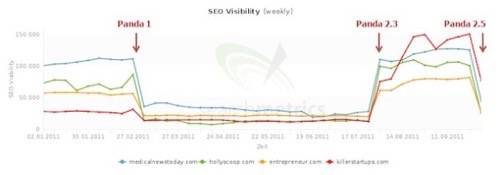Google recently rolled out version 2.5 of its tweaks to the search ranking algorithm – codenamed Panda – to improve the quality of search results for users. Panda suppresses the impact of content farms and other low-quality sites that game the system.

New data from Searchmetrics show that consumeraffairs.com, savings.com and prnewswire.com were among the biggest losers. Consumer sites like Motor Trend and technology blogs The Next Web and Technorati also lost significant ground since the update. The biggest winner in Google’s Panda update? YouTube, Google’s own Web property.
Tweaking The Results
Searchmetrics measures the SEO visibility of sites around the Web. It has tracked Panda’s impact since version 1 and found that results have fluctuated significantly in each successive update. The Panda 2.3 update in July restored the page rank of some sites that were heavily impacted by Panda 1, and the new 2.5 update seems to have corrected that reversal.

Impact On The Big Sites
In absolute numbers, major sites like Myspace, Amazon, Comcast.net and Huffington Post have all lost SEO visibility since the Panda update. Myspace was at the top of the list, losing 421,370 places. That amounts to a loss of about 13%.
Marcus Tober of Searchmetrics says that this can’t be conclusively attributed to Panda, because the big losers in relative terms lost 50% or more of their page rank visibility. The Searchmetrics report cleans up the list by only focusing on sites that lost big in both relative and absolute terms.
Panda’s Latest Winners
The sites that gained ground in the Panda 2.5 update include reputable sites like YouTube, Last.fm, Zappos and the Washington Post. It’s worth noting that Youtube and Android.com, both Google properties, each gained by 10% in this update, with YouTube topping the absolute list of gains.
Google maintains that the Panda updates are conducted meticulously with solely the users’ interests at heart, and it backs that up with an extensive list of criteria. But eyebrows always raise when Google makes an adjustment to search that benefits its own sites.
To learn more about how Google defines quality and builds it into its search algorithms, check out this in-depth panel discussion with Amit Singhal, Matt Cutts and Ben Gomes, some of Google’s top search people:
What do you think of the sites on this list? Did Google do the right thing by reducing their page rank? Let’s discuss in the comments.

















